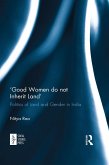In re-reading these Acts and exploring the wider nexus of Indian society in which the legislation was drafted, this study considers how questions of family structure and property rights contribute to the creation of legal subjects and demonstrates the significance of the politico-economic context of rights formulation. On the basis of an ethnography of a village in West Bengal, this book brings the moral axis of inheritance into sharp focus, elucidating the interwoven dynamics of bequest, distribution of family wealth and reciprocity of care work that are integral to the logic of inheritance. It explains why inheritance rights based on the notion of individual property rights are inadequate to account for practices of inheritance.
Mondal shows that inheritance includes normative structures of affective attachment and expectations, i.e., evaluatively-charged imaginaries of the future that coordinate present practices. These insights pose questions of the dominant resource-based conceptualisation of inherited property in the debate on women's empowerment. In doing so, this work opens up a line of investigation that brings feminist rights discourse into conversation with ethics, enriching the liberal theory of gender justice.
Dieser Download kann aus rechtlichen Gründen nur mit Rechnungsadresse in A, B, BG, CY, CZ, D, DK, EW, E, FIN, F, GR, HR, H, IRL, I, LT, L, LR, M, NL, PL, P, R, S, SLO, SK ausgeliefert werden.









